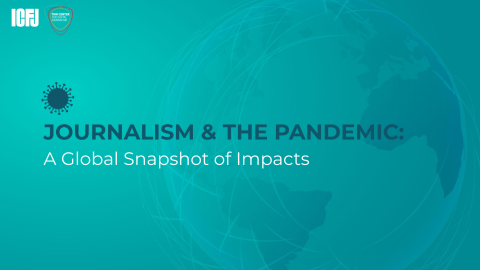
Facing everything from a barrage of disinformation to heightened security risks and a mental health crisis, journalists around the world are contending with myriad daunting challenges as they report on a deadly pandemic, according to the first results from a global survey on journalism and the COVID-19 crisis.
The International Center for Journalists (ICFJ) and the Tow Center for Digital Journalism at Columbia University launched the Journalism and the Pandemic Project in April 2020 to study the impacts on the field worldwide. Based on survey responses from more than 1,400 English-speaking journalists in 125 countries, the first report from the project surfaces alarming obstacles and threats confronting journalism during the first stage of the pandemic.
Among the most troubling findings is the identification of politicians and elected officials as top sources of disinformation by nearly half of our respondents (46%), highlighting a serious lack of trust in governments. At the same time, nearly one-third said they were relying more heavily on government sources and official statements to report on the pandemic.
In a related key finding, Facebook was identified as the most prolific spreader of disinformation by respondents (66%). Yet 32% said they were more reliant on social media platforms to connect with audiences.
Other red flag-raising findings for journalists covering the ongoing crisis:
- 70% of our respondents rated the psychological and emotional impacts of dealing with the COVID-19 crisis as the most difficult aspect of their work during the period.
- 30% said that their news organizations had not supplied field reporters with a single piece of protective equipment during the first wave of the pandemic.
- 17% with knowledge of their organizations’ financial losses reported that revenue was down over 75% since the pandemic began; 43% indicated that revenues were down by over half.
- 81% said they encounter disinformation at least weekly, with more than one-quarter (28%) identifying false information many times a day.
- 20% said their experience of online harassment was “much worse” during the pandemic.
- 48% said their sources had expressed fear of retaliation for speaking to journalists during the pandemic.
But the picture is not all bleak. Despite the challenges, journalists indicated that they have some reasons for optimism:
- 43% said they felt audience trust in their journalism, or that of their news organization, had increased during the first wave of the pandemic.
- 61% reported that they felt an increased commitment to journalism as a result of the pandemic.
The research was conducted by ICFJ’s Global Director of Research, Dr. Julie Posetti; Leonard Tow Professor of Journalism and the Director of the Tow Center for Digital Journalism at Columbia Journalism School, Emily Bell; and Dr. Pete Brown, research director at the Tow Center for Digital Journalism.
The report is the first of a data-driven research series (which will also draw on surveys conducted in six other languages) that will address the challenges of reporting on COVID-19 and offer guideposts for reimagining a post-pandemic future for journalism.
The Journalism and the Pandemic Project is supported by global philanthropic organization Luminate, and the Committee to Protect Journalists (CPJ) is a partner organization.
[Read the full report here]
For comment, please contact: Dr. Julie Posetti (jposetti@icfj.org); Prof. Emily Bell (eb2740@columbia.edu); Dr. Pete Brown (pdb2123@columbia.edu); or ICFJ Communications Director, Erin Stock (estock@icfj.org).